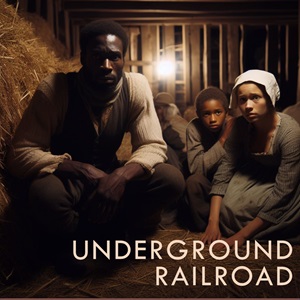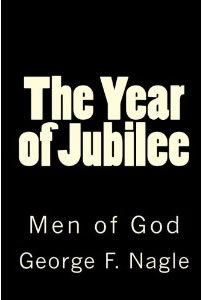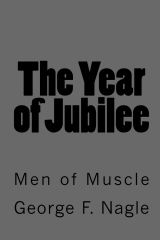 Slavery
Slaveryto
freedom


Study Areas
Underground Railroad
George Solomon, Daniel Neall, Benjamin R. Fletcher and Maria Dorsey Reach Harrisburg
From the pages of William Still's The Underground Railroad
The story below is taken from William Still's 1872 work, The Underground Railroad. As a member of Philadelphia's Vigilance Committee, Still and his agents worked secretly to coordinate the reception and movement of southern freedom seekers from bondage to freedom and security, generally in Canada. The four people in the story below, George Solomon, Daniel Neall, Benjamin R. Fletcher and Maria Dorsey, made the entire journey on foot from Washington, DC to Harrisburg, where they were taken in and protected by the Harrisburg agents of the network, headed by Joseph Bustill.

GEORGE SOLOMON, DANIEL NEALL, BENJAMIN R. FLETCHER AND MARIA DORSEY. Benjamin R. Fletcher and Daniel Neall arrived safely in St. Catherine, Canada West, on Friday, September 12, less than two weeks after their escape from their Washington DC plantations. The efficiency of the Underground Railroad network through Pennsylvania during this time is seen by this rapid passage. The four freedom seekers profiled in Still's narrative above covered nearly the entire 120 -mile distance between Washington and Harrisburg on foot, a journey that probably took them five to six days if accounting for the need to avoid main roads and detection.
Upon reasching Harrisburg and Bustill's local network of Underground Railroad workers, they likely were given food, rest, any needed medical care and probably a change of clothes since they were probably still attired in the easily identifiable "Negro clothes" typical to the plantations of the Chesapeake region of this time period. Bustill would have contacted William Still and any intermediary station agents before sending them to Philadelphia. All of this work upon taking in weary freedom seekers would have taken a day or two at a minimum.
William Still, upon receiving the four travelers, always logged their arrival in Philadelphia, took detailed notes on thier descriptions, ages, and then interviewed them to gain insights into thier personal stories. Although he reported "nothing remarkable" in their stories, he still reveals rich details of thier places on the plantations, their mindsets, and considerable information about family members left behind.
The advertisement placed by George Parker for Daniel and Maria, referred to by Still in the story and shown at the top of the page, was first placed on September 10th, by which time, Still notes, all four were either in Philadelphia or on their way to St. Catherine. That settlement in Canada, being an abolitionist stronghold and chief destination for those on the Underground Railroad, already had a population of about 6,000, 800 of whom were of African descent, Harriet Tubman and William Howard Day among them.
St. Catherine was a destination for Loyalists fleeing the United States after the Revolutionary War. Among the Loyalist families were the Merritts, from New York. A son, businessman and politician William Hamilton Merritt, was sympathetic to the abolitionist cause in the United States and financed two Black churches that would anchor the growing Black refugee community. Merritt also made it possible for arriving Blacks to purchase building lots at low prices.
William Still's contact at St. Catherine, and the correspondent aiding Daniel Neall and Benjamin Fletcher was the Rev. Hiram Wilson. Wilson, a dedicated abolitionist, was one of the "Lane Rebels" who abandoned the theology school for Oberlin College. There he was recruited by Theodore Dwight Weld as one of "The Seventy," a cadre of highly-trained abolitionist speakers and activists, and was personally sent by Charles Grandison Finney to Canada to work with the growing number of Blacks settling there to escape slavery in the United States. Wilson's specialty was education, and he established schools in the various communities of now-free Blacks that were springing up.
Read more about how "The Seventy" spread abolitionist fervor throughout central Pennsylvania.
The above representatives of the unrequited laborers of the South fled directly from Washington, D. C. Nothing remarkable was discovered in
their stories of slave life; their narratives will therefore be brief.
George Solomon was owned by Daniel Minor, of Moss Grove, Va. George was about thirty-three years of age; mulatto, intelligent, and of prepossessing appearance. His old master valued George's services very highly, and had often declared to others, as well as to George himself, that without him he should hardly know how to manage. And frequently George was told by the old master that at his "death he was not to be a slave any longer, as he would have provision made in his will for his freedom." For a long time this old story was clung to pretty faithfully by George, but his "old master hung on too long," consequently George's patience became exhausted. And as he had heard a good deal about Canada, U. G. R. R., and the Abolitionists, he concluded that it would do no harm to hint to a reliable friend or two the names of these hard places and bad people, to see what impression would be made on their minds; in short, to see if they were ready to second a motion to get rid of bondage. In thus opening his mind to his friends, he soon found a willing accord in each of their hearts, and they put their heads together to count up the cost and to fix a time for leaving Egypt and the host
of Pharaoh to do their own "hewing of wood and drawing of water." Accordingly George, Daniel, Benjamin and Maria, all of one heart and mind, one "Saturday night" resolved that the next Sunday should find them on the U. G. R. R., with their faces towards Canada.
Daniel was young, only twenty-three, good looking, and half white, with a fair share of intelligence. As regards his slave life, he acknowledged
that he had not had it very rough as a general thing; nevertheless, he was fully persuaded that he had "as good a right to his freedom" as his "master had to his," and that it was his duty to contend for it.
Benjamin was twenty-seven years of age, small of stature, dark complexion, of a pleasant countenance, and quite smart. He testified, that "ill- treatment from his master," Henry Martin, who would give him "no chance at all," was the cause of his leaving. He left a brother and sister, belonging to Martin, besides he left two other sisters in bondage, Louisa and Letty, but his father and mother were both dead. Therefore, the land of slave-whips and auction-blocks had no charms for him. He loved his sisters, but he knew if he could not protect himself, much less could he protect them. So he concluded to bid them adieu forever in this world.
Turning from the three male companions for the purpose of finding a brief space for Maria, it will be well to state here that females in attempting
to escape from a life of bondage undertook three times the risk of failure that males were liable to, not to mention the additional trials and struggles they had to contend with. In justice, therefore, to the heroic female who was willing to endure the most extreme suffering and hardship for freedom, double honors were due.
Maria, the heroine of the party, was about forty years of age, chestnut color, medium size, and possessed of a good share of common sense. She was owned by George Parker. As was a common thing with slave-holders. Maria had found her owners hard to please, and quite often, without the slightest reason, they would threaten to "sell or make a change." These threats only made matters worse, or rather it only served to nerve Maria for the conflict. The party walked almost the entire distance from Washington to Harrisburg, Pennsylvania.
In the meantime George Parker, the so-called owner of Daniel and Maria, hurriedly rushed their good names into the "Baltimore Sun," after the following manner --
"FOUR HUNDRED DOLLARS REWARD. -- Ranaway from my house on Saturday night, August 30, my negro man 'Daniel,' twenty-five years of age, bright yellow mulatto, thick set and stout made.
While this advertisement was in the Baltimore papers, doubtless these noble passengers were enjoying the hospitalities of the Vigilance Committee, and finally a warm reception in Canada, by which they were greatly pleased. Of Benjamin and Daniel, the subjoined letter from Rev. H. Wilson is of importance in the way of throwing light upon their whereabouts in Canada:
Also, my negro woman, 'Maria,' forty years of age, bright mulatto. The above re- ward will be paid if delivered in Washington city.
GEORGE PARKER."
ST. CATHERINE, C. W., Sept. 15th, 1856.
Mr. William Still: -- Dear Sir -- Two young men arrived here on Friday evening last from Washington, viz: Benjamin R. Fletcher and Daniel Neall. Mr. Neall (or Neale) desires to have his box of clothing forwarded on to him. It is at Washington in the care of John Dade, a colored man, who lives at Doct. W. H. Gilman's, who keeps an Apothecary store on the corner of 4 1/2 and Pennsylvania Avenue. Mr. Dade is a slave, but a free dealer. You will please write to John Dade, in the care of Doct. W. H. Gilman, on behalf of Daniel Neale, but make use of the name of George Harrison, instead of Neale, and Dade will understand it. Please have John Dade direct the box by express to you in Philadelphia; he has the means of paying the charges on it in advance, as far as Philadelphia; and as soon as it comes, you will please forward it on to my care at St. Catherine. Say to John Dade, that George Harrison sends his love to his sister and Uncle Allen Sims, and all inquiring friends. Mr. Fletcher and Mr. Neale both send their respects to you, and I may add mine. Yours truly, HIRAM WILSON
P. S. Mr. Benjamin R. Fletcher wishes to have Mr. Dade call on his brother James, and communicate to him his affectionate regards, and make known to him that he is safe, and cheerful and happy. He desires his friends to know, through Dade, that he found Mrs. Starke here, his brother Alfred's wife's sister; that she is well, and living in St. Catharine, C. W., near Niagara Falls. H. W.Notes
Sources
Now Available on this site
The Year of Jubilee
Vol. 1: Men of God and Vol. 2: Men of Muscle
by George F. Nagle
Both volumes of the Afrolumens book are now available on this website. Click the link to read.
The Year of Jubilee is the story of Harrisburg'g free African American community, from the era of colonialism and slavery to hard-won freedom.
 Volume
One, Men of God, covers the turbulent beginnings of this community,
from Hercules and the first slaves, the growth of slavery in central
Pennsylvania, the Harrisburg area slave plantations, early runaway
slaves, to the birth of a free black community. Men of God is a detailed
history of Harrisburg's first black entrepreneurs, the early black
churches, the first black neighborhoods, and the maturing of the social
institutions that supported this vibrant community.
Volume
One, Men of God, covers the turbulent beginnings of this community,
from Hercules and the first slaves, the growth of slavery in central
Pennsylvania, the Harrisburg area slave plantations, early runaway
slaves, to the birth of a free black community. Men of God is a detailed
history of Harrisburg's first black entrepreneurs, the early black
churches, the first black neighborhoods, and the maturing of the social
institutions that supported this vibrant community.
It includes an extensive examination of state and federal laws governing slave ownership and the recovery of runaway slaves, the growth of the colonization movement, anti-colonization efforts, anti-slavery, abolitionism and radical abolitionism. It concludes with the complex relationship between Harrisburg's black and white abolitionists, and details the efforts and activities of each group as they worked separately at first, then learned to cooperate in fighting against slavery. Read it here.
Non-fiction, history. 607 pages, softcover.
 Volume
Two, Men of Muscle takes the story from 1850 and the Fugitive Slave
Law of 1850, through the explosive 1850s to the coming of Civil War
to central Pennsylvania. In this volume, Harrisburg's African American
community weathers kidnappings, raids, riots, plots, murders, intimidation,
and the coming of war. Caught between hostile Union soldiers and deadly
Confederate soldiers, they ultimately had to choose between fleeing
or fighting. This is the story of that choice.
Volume
Two, Men of Muscle takes the story from 1850 and the Fugitive Slave
Law of 1850, through the explosive 1850s to the coming of Civil War
to central Pennsylvania. In this volume, Harrisburg's African American
community weathers kidnappings, raids, riots, plots, murders, intimidation,
and the coming of war. Caught between hostile Union soldiers and deadly
Confederate soldiers, they ultimately had to choose between fleeing
or fighting. This is the story of that choice.
Non-fiction, history. 630 pages, softcover.